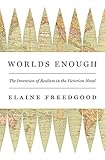Worlds Enough : The Invention of Realism in the Victorian Novel / Elaine Freedgood.
Material type: TextPublisher: Princeton, NJ : Princeton University Press, [2019]Copyright date: ©2019Description: 1 online resource (184 p.)Content type:
TextPublisher: Princeton, NJ : Princeton University Press, [2019]Copyright date: ©2019Description: 1 online resource (184 p.)Content type: - 9780691193304
- 9780691194301
- English fiction -- 19th century -- History and criticism
- English literature -- 19th century -- History and criticism
- Realism in literature
- LITERARY CRITICISM / European / English, Irish, Scottish, Welsh
- Adam Bede
- Allegory
- Allusion
- Amelia Edwards
- Amos Tutuola
- Banishing
- C. L. R. James
- Casaubon
- Case study
- Catherine Belsey
- Character (arts)
- Chartism
- Chinese literature
- Colonialism
- Commodity
- Copyright
- Cosmopolitanism
- Criticism
- D. A. Miller
- Daniel Deronda
- Decolonization
- Diegesis
- Elizabeth Gaskell
- English novel
- Epigraph (literature)
- Exploration
- Farce
- Fiction
- First-person narrative
- Franco Moretti
- Frantz Fanon
- Fredric Jameson
- Genre
- George Eliot
- Historical fiction
- Ibid (short story)
- Ideology
- Illustration
- Intertextuality
- Jane Austen
- Japanese literature
- Joke
- Literary criticism
- Literary realism
- Literature
- Madame Bovary
- Mark Z. Danielewski
- Mary Barton
- Metafiction
- Metalepsis
- Microorganism
- Middlemarch
- Modern Language Association
- Modernism
- Modernity
- Muslin
- Nana Sahib
- Narration
- Narrative
- New Historicism
- Newspaper
- Novel
- Novelist
- Paratext
- Payment
- Pierre Bourdieu
- Poet
- Poetry
- Post-structuralism
- Postmodern literature
- Postmodernism
- Prose
- Psychoanalysis
- Publishing
- Rhoda Broughton
- Robert Louis Stevenson
- Roland Barthes
- Romanticism
- Samuel Taylor Coleridge
- Satire
- Scrimshaw
- Ship
- Slavery
- South Seas (genre)
- Subjectivity
- Supernatural fiction
- T. S. Eliot
- Technology
- The Other Hand
- The Palm-Wine Drinkard
- The Political Unconscious
- Typee
- Underdevelopment
- University of Cape Town
- Victorian literature
- Virginia Woolf
- William Shakespeare
- World literature
- Writer
- Writing
- 823.80912 23
- PR878.R4 F7 2020
- online - DeGruyter
| Item type | Current library | Call number | URL | Status | Notes | Barcode | |
|---|---|---|---|---|---|---|---|
 eBook
eBook
|
Biblioteca "Angelicum" Pont. Univ. S.Tommaso d'Aquino Nuvola online | online - DeGruyter (Browse shelf(Opens below)) | Online access | Not for loan (Accesso limitato) | Accesso per gli utenti autorizzati / Access for authorized users | (dgr)9780691194301 |
Browsing Biblioteca "Angelicum" Pont. Univ. S.Tommaso d'Aquino shelves, Shelving location: Nuvola online Close shelf browser (Hides shelf browser)

|

|

|

|

|

|

|
||
| online - DeGruyter The Passion Projects : Modernist Women, Intimate Archives, Unfinished Lives / | online - DeGruyter The Nuclear Borderlands : The Manhattan Project in Post-Cold War New Mexico New Edition / | online - DeGruyter The River Twice : Poems / | online - DeGruyter Worlds Enough : The Invention of Realism in the Victorian Novel / | online - DeGruyter A History of Art History / | online - DeGruyter Peaceful Families : American Muslim Efforts against Domestic Violence / | online - DeGruyter Michelangelo, God's Architect : The Story of His Final Years and Greatest Masterpiece / |
Frontmatter -- Contents -- Preface. Worlds Enough -- Acknowledgments -- Introduction. How the Victorian Novel Became Realistic (in a French Way), Reactionary, and Great -- Case Study 1. Denotation -- Case Study 2. Omniscience -- Case Study 3. Paratext -- Case Study 4. Hetero-Ontologicality -- Case Study 5. Reference -- Conclusion. Decolonizing the Novel -- Index
restricted access online access with authorization star
http://purl.org/coar/access_right/c_16ec
A short, provocative book that challenges basic assumptions about Victorian fictionNow praised for its realism and formal coherence, the Victorian novel was not always great, or even good, in the eyes of its critics. As Elaine Freedgood reveals in Worlds Enough, it was only in the late 1970s that literary critics constructed a prestigious version of British realism, erasing more than a century of controversy about the value of Victorian fiction.Examining criticism of Victorian novels since the 1850s, Freedgood demonstrates that while they were praised for their ability to bring certain social truths to fictional life, these novels were also criticized for their formal failures and compared unfavorably to their French and German counterparts. She analyzes the characteristics of realism—denotation, omniscience, paratext, reference, and ontology—and the politics inherent in them, arguing that if critics displaced the nineteenth-century realist novel as the standard by which others are judged, literary history might be richer. It would allow peripheral literatures and the neglected wisdom of their critics to come fully into view. She concludes by questioning the aesthetic racism built into prevailing ideas about the centrality of realism in the novel, and how those ideas have affected debates about world literature.By re-examining the critical reception of the Victorian novel, Worlds Enough suggests how we can rethink our practices and perceptions about books we think we know.
Mode of access: Internet via World Wide Web.
In English.
Description based on online resource; title from PDF title page (publisher's Web site, viewed 25. Jun 2024)


